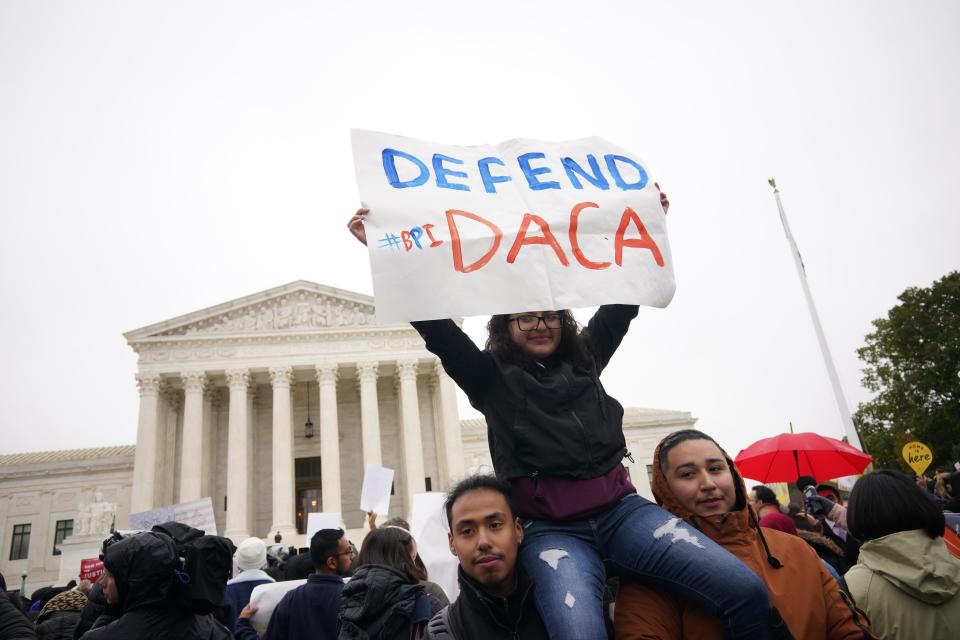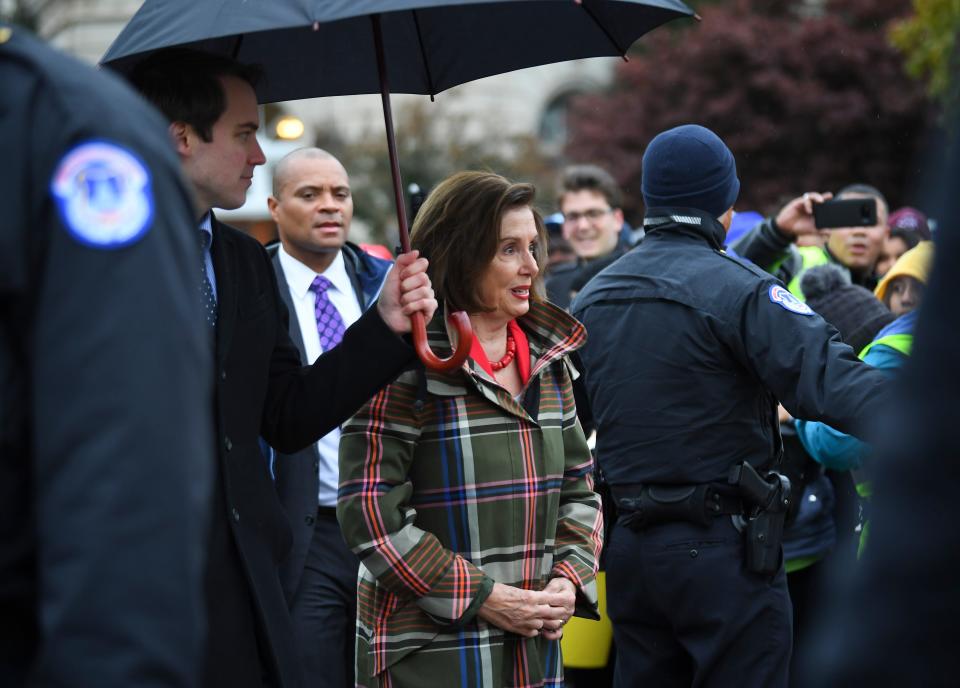DACA: Even a Supreme Court win for Trump could create tough political choices in 2020
Now that the Supreme Court has completed oral arguments over the Trump administration's attempt to end the Deferred Action for Childhood Arrivals (DACA) program, all eyes will turn toward the court's springtime decision that will insert the emotional issue directly into the 2020 presidential campaign.
If the justices rule that the Trump administration wrongly terminated the program, then the roughly 700,000 DACA recipients, sometimes referred to as "DREAMers" who have been protected from deportation and granted work permits will be able to continue their American lives for a while longer.
But if the court sides with the Trump administration and allows it to end the program, it will set up a high-stakes, politically-wrought decision for the Trump administration just months before the November election.
If the administration immediately terminates the program at that moment, it runs the risk of angering voters sympathetic to DREAMers, who make up significant portions of the electorate in swing states like Arizona, Florida, Michigan, North Carolina and Pennsylvania.
If the administration decides to delay any action until after the election, it runs the risk of angering Trump's core supporters who were promised the program, which they decry as "amnesty," would be shut down under his watch.
"It does present a political challenge," said Mark Krikorian, executive director of the Center for Immigration Studies, a group that advocates for lower levels of legal and illegal immigration and has advised the Trump White House on immigration issues. "They are going to have to navigate it very carefully."

During an extended, 80-minute session on Tuesday, the court's conservative justices appeared to side with the Trump administration and its liberal justices appeared to oppose it. That means the decision could once again rest in the hands of Chief Justice John Roberts, who gave only limited indication Tuesday about which direction he is leaning.
More: Supreme Court leans toward Trump plan to end DACA program
Immigration advocacy groups and lawyers who filed the legal challenge against Trump all voiced a level of optimism after the oral arguments. A win for that side would mean the Trump administration is forced to continue the program, and would have to begin another lengthy round of legal battles if it tries to end the program a second time.
But if the court allows Trump to end the program, he will face three difficult options:
Seek a compromise with Congress
Shortly before the Supreme Court started its session on Tuesday, Trump tweeted out a missive that claimed "some" DREAMers in the DACA program are "tough, hardened criminals" (to qualify for DACA, and to renew one's status, applicants must pass a criminal background check each time).
But at the end of the tweet, he threw out a glimmer of hope that a compromise with Congress could be reached. "If Supreme Court remedies with overturn, a deal will be made with Dems for them to stay!" he wrote.
Many of the people in DACA, no longer very young, are far from “angels.” Some are very tough, hardened criminals. President Obama said he had no legal right to sign order, but would anyway. If Supreme Court remedies with overturn, a deal will be made with Dems for them to stay!
— Donald J. Trump (@realDonaldTrump) November 12, 2019
That's a hollow promise for Democrats and immigration advocates to accept, given the president's history when it comes to dealing with Congress on legislation to permanently protect DREAMers.
The president already has voiced wildly conflicting plans for DREAMers. He has expressed sympathy for them, called for their deportation, and ultimately tried to end the program that has protected them for seven years.
DACA: Undocumented lawyers await Supreme Court ruling
Frank Sharry, executive director of America's Voice, a Washington, D.C-based advocacy group that supports protections for DREAMers, said the president has been equally difficult to pin down in his negotiations with Congress.
He has often tied any deal for DREAMers with a wide range of conservative proposals to stem illegal immigration, including funding for an expansion of the southern border wall, the nationwide implementation of the E-Verify system that allows employers to screen the immigration status of job applicants, and widespread changes to the legal immigration system.
Sharry cited five instances where a legislative solution appeared close at hand, but said Trump and his senior adviser on immigration, Stephen Miller, torpedoed every chance, even forcing a government shutdown.
Add Congress' reluctance to act on any immigration-related issues in an election year, and expected inter-party animosity following the ongoing impeachment proceedings, and Sharry said chances of a summer congressional compromise are "slim to none."
Maintain DACA until after election
With the vote looming, Trump could decide to allow DACA to remain in place, simply pushing the issue past the November election.
Polls have repeatedly found that a majority of Americans support granting legal protections to DREAMers — undocumented immigrants who were brought to the country as children, including those participating in DACA. Some of the most critical swing states, like Florida and Arizona, already have sizable Hispanic populations. And other swing states, like North Carolina and Michigan, have seen their Hispanic populations increase dramatically in recent decades.
More: American dreams at stake for nearly 700,000 immigrants
Krikorian said those demographics, and widespread support for DREAMers among non-Hispanics, would make it difficult for Trump to terminate the program immediately given the "political risk" such a move would carry. He said Trump may be able to convince his supporters that he tried to end DACA, was stymied by the courts, and will vow to finish the job if reelected.
"I just think punting to after the election might be the least risky option," Krikorian said. "They can say, 'All the more reason to vote for the president’s reelection and Republican members of Congress so we can have a balanced deal in 2021 with a new Congress instead of rush to do something now.'”
The risk in that approach is alienating the core Trump voters who have stuck with him throughout his three years in office.
End DACA immediately
If given the green light by the Supreme Court, and if Trump decides it's more important to satisfy that base, he could move to end the program immediately.
Sharry said that would fit Trump's campaign strategy in 2016, which never featured outreach to middle-of-the-road voters.
"If his strategy is 'juice the white grievance voters' then the idea of being nice to DREAMers is counterfactual to that theory," Sharry said. "If anything, it could undermine that base."
Todd Schulte, president of FWD.us, an immigration advocacy group created by Bill Gates, Mark Zuckerberg and other tech titans, said a quick termination would also mirror Trump's campaign strategy heading into 2018. During that summer, the administration pushed a deeply unpopular family separation policy in the months leading up to the midterm elections that resulted in a Democratic takeover of the House of Representatives.
"That was the biggest story in the country for 10 weeks, and it proved devastating in the midterms," Schulte said.
'Just as American as they are': Activists, DACA recipients gather as Supreme Court hears case
A similar backlash would likely emerge, Schulte said, by trying to wind down DACA in the months leading up to the 2020 election. Under terms of the program, recipients get DACA protections and work permits for 2-year periods. If they terminate the program, those protections would end for more than 1,000 recipients a week, leading to a never-ending series of heart-wrenching stories from around the country.
"In every corner of the country, in every city, local news coverage is going to be companies saying goodbye to beloved teammates," Schulte said. "That means the consequences are not just the repeal of 700,000 (people with DACA), it's their coworkers, their family members, their friends."

This article originally appeared on USA TODAY: Supreme Court's DACA decision will create a political test for Trump

